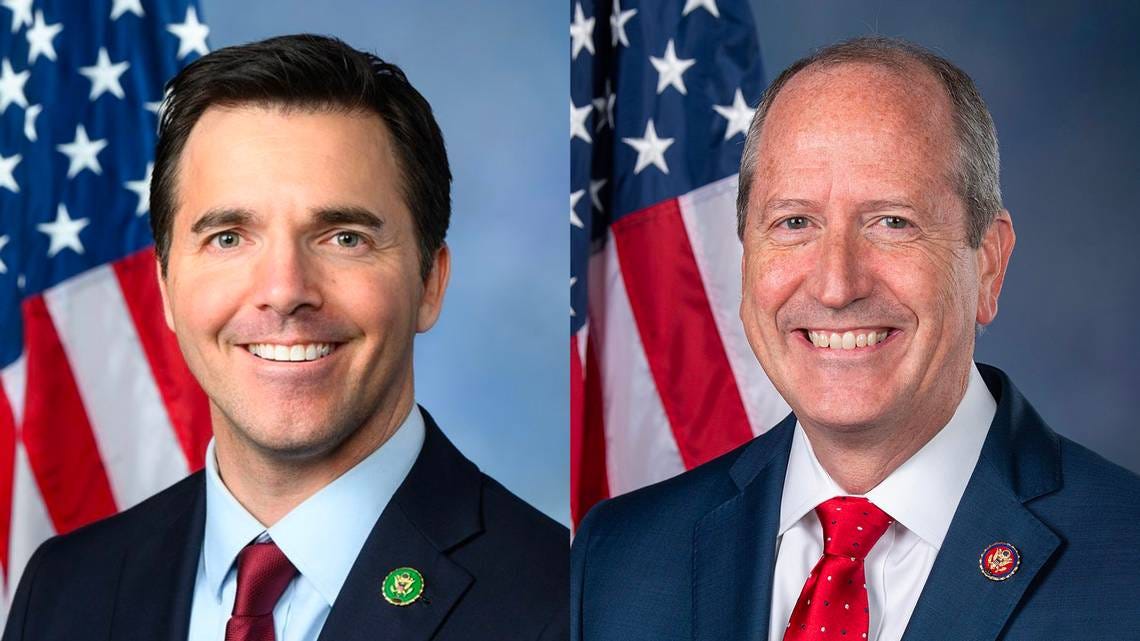You're Probably Getting Screwed by Attorneys General
AG Candidates Should be Talking About Corporate Monopolies!
Welcome to You’re Probably Getting Screwed, a weekly newsletter and video series from J.D. Scholten and Justin Stofferahn about the Second Gilded Age and the ways economic concentration is putting politics and profits over working people.
Welcome to October, election day is around the corner! While the presidential race dominates the news, there are plenty of important races across the country (a certain Iowa legislator is running for reelection!) including 10 states with the attorney general on the ballot.
State attorneys general play a huge role in reigning in the abuses of corporate monopolies. Bipartisan coalitions of state AGs have often joined the Department of Justice (DOJ) and Federal Trade Commission (FTC) in lawsuits seeking to block mega-mergers or stop anticompetitive conduct. AGs also enforce and can advocate for state antitrust laws and other protections for workers, small businesses and farmers or for additional funding as many attorneys general lack the necessary enforcement staff.
Despite this critical role, campaigns for these offices often focus on public safety, corruption and more recently reproductive rights. Those issues are obviously important, but at a time when voters of all stripes are expressing distaste for corporate monopolies and are concerned about their influence, attorneys general should be playing a major role.
Of the 10 states featured in the map above, the two most competitive are in the battleground states of Pennsylvania and North Carolina. In Pennsylvania - a state without an antitrust law - former Auditor General Eugene DePasquale (D) is running against York County District Attorney Dave Sunday (R).
DePasquale it touting his “Record of Standing up to Bullies.” Among the key priorities he has outlined in interviews is addressing healthcare consolidation and ensuring large health systems don’t monopolize the industry, a major issue in a state that is home to the massively powerful University of Pittsburgh Medical Center (UMPC). On his website DePasquale also emphasizes worker protections and cracking down on corporate power as key priorities. Sunday meanwhile has focused on public safety and immigration and does not appear to have said anything about corporate power.
Antimonopoly has gotten little attention in North Carolina despite outgoing Attorney General Josh Stein (D) recently suing RealPage for price-fixing rents and generic drug manufacturers for inflating prices. Stein also touted his record of cracking down on monopolies in announcing a new small business coalition supporting his current gubernatorial bid. Running to replace Stein are Congressmen Jeff Jackson (D) and Dan Bishop (R), each of which have focused on issues besides corporate power. In Congress neither candidate has a strong record on these issues either, but Bishop in particular has used his time on the Judiciary Committee to question the Federal Trade Commission’s authority to ban noncompete clauses and suggested Chair Lina Khan wields too much power, as opposed to say the monopolists.
Outside these highly competitive races, there are candidates for attorney general touting their populist credentials. Vermont Attorney General Charity Clark (D) has taken on pharmacy benefit managers while in office, suing CVS Caremark and Express Scripts, which control 95% of the market in Vermont. Clark also asked joined the DOJ antitrust suit against Ticketmaster-Live Nation and has fought for new privacy protections as a way to address Big Tech’s surveillance business model.
Indiana Democrat Destiny Wells - in a race that could be closer than expected - has made worker protections a key priority. “We have never reimagined the attorney general’s office to serve workers, to serve the middle class, and we want to create a worker’s rights task force similar to what other states have on a much broader scope. We want to be able to look at things like wage theft, worker misclassification.”
Similar to Wells, Oregon Democrat Dan Rayfield has a plan to build a new labor enforcement team in the Attorney General’s Office and crack down on a range of worker abuses. This includes going after wage theft, union busting, misclassification and noncompete clauses.
Every AG candidate should take a tip from Missouri Democrat Elad Gross and his plan to “Bust The Trusts” that includes cracking down on anticompetitive behavior, policing price fixing, preventing mega mergers, and investigating “Big Tech, Big Ag, Big Agriculture, Big Health Care, Big Energy, Big Telecom, Big Retail, and Big Finance.”
This of course is just a peak at current conditions. Many more AGs will be on the ballot in 2026, but it says something that so few candidates are touting efforts to curb concentrated corporate power this year. This includes the Democratic Attorneys General Association and the Republican Attorneys General Association which make scant mention of corporate monopolies. Every debate between attorney general candidates should include questions about how to address our monopoly crisis, because if the only people talking about it are in Washington DC, we are screwed.
YOU’RE PROBABLY (ALSO) GETTING SCREWED BY:
Not Jonathan Kanter
Speaking of AGs, Assistant Attorney General for Antitrust Jonathan Kanter is having a moment. As we talked about previously in August, a federal court issued a monumental decision in the DOJ’s case against Google, holding that Google Search and the text ads in that search engine are monopolies and that Google has used anticompetitive tactics to protect those monopolies.
Rolling Stone just came out with an article about the DOJ’s blockbuster lawsuit against Live Nation and Bloomberg’s article about his efforts came with this epic photo (be sure to read the caption):
Not Paying Essential Workers
Workers are standing up for better wages. Nationally, you’ve probably heard about the dock workers that were on strike. J.D. also flagged that in Cedar Rapids, Iowa, around 100 workers at the Cargill Corn Milling are officially on strike.
Investor-Owned Electric Utilities
The American Economic Liberties Project recently released a report on “Reforming the Utility System to Better Serve the American Public.”
Members of Congress
The Farm Bill was due almost a year ago (September of 2023)… Failure to pass or extend federal farm bill would spell catastrophe, agriculture policy analysts say.
Private Equity in Healthcare
AB 3129 is a bill that would have given the California Attorney General greater ability to review and block private equity firms or hedge funds from purchasing healthcare facilities and interfere in the practice of medicine. The good news is that legislators passed the bill, but the bad news is Governor Gavin Newsom vetoed the bill.
SOME GOOD NEWS
Consumer Financial Protection Bureau’s State Legislation
Welcome to the Antimonopoly Movement Michael Jordan
BEFORE YOU GO
Before you go, I need two things from you: 1) if you like something, please share it on social media or the next time you have coffee with a friend. 2) Ideas, if you have any ideas for future newsletter content please comment below. Thank you.
Break ‘Em Up,
Justin Stofferahn










